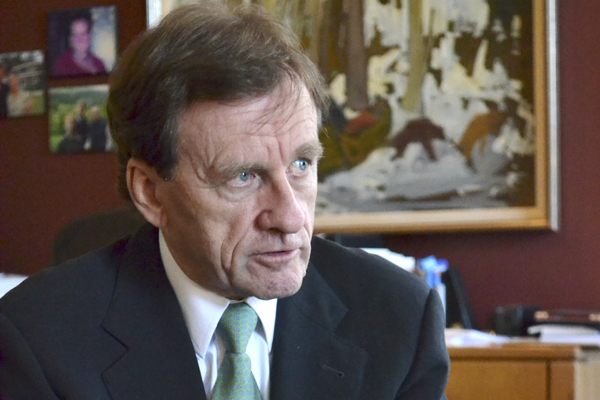University of Ottawa president Allan Rock sat down with the Fulcrum on April 3 to provide updates on this year’s top news stories.
Light Rail Transit (LRT) construction
Rock said although LRT construction is “a nuissance,” we’ll just have to “grit our teeth” until its planned completion in 2018.
Construction on the LRT began April 19, 2013. The entirety of the Confederation Line, running from Blair to Tunney’s Pasture, should be finished by 2018, according to Mayor Jim Watson. In the interim, students, staff, and professors have had to endure the disruptions. A sinkhole, measuring about eight metres wide and 12 metres deep, opened up early Feb. 21 at the intersection of Waller Street and Laurier Avenue, but has since been closed, and construction has resumed.
“LRT is a nuisance; it’s noisy, it’s dirty,” Rock said. “We’ve had complaints from people in residence about it, because it starts early and goes late. But as we said from the beginning, we’re no different from anybody else in the city. We all have to pay a price to put in place this urban planning system by 2018. There are inconveniences throughout the city.”
“We are vigilant to make sure the people doing the work comply with the rules in place in terms of the timing of the work and the amount of noise that they make, and also respect their responsibility for cleaning up. But beyond that, all I can say is that we have to grit our teeth and make it to 2018.”
“The good news is, if it does open in 2018, we’ll have in place a rapid transit system that will get us from here to the Lees campus in three minutes. It will open up a whole new world of possibility for the university.”
Rock said the university has purchased land near the Lees campus that is zoned for dense development.
Housing
Rock said the new land at Lees campus would lend well to a residence building.
There is insufficient on-campus housing, making it necessary for students to rent in surrounding areas. City council rejected a proposal by developer Viner Assets to build a 180-unit student residence at the intersection of Laurier Avenue and Friel Street in a 14–9 vote on March 26.
Because the U of O has grown by about 10,000 students since the year 2000, it has been unable to accommodate all the students who need to live in residence. The university is seeking to create additional off-campus housing in the downtown region by converting private properties to house students, as well as building a new residence on Henderson Avenue.
Residents of Sandy Hill have complained that the growing number of students would have a negative impact in the historical neighbourhood.
Rock said construction is starting on a new residence on Henderson Avenue, behind the Advanced Research Complex, and that the university administration is looking at other short-term measures that have not yet been made public because they are in negotiations.
“Fact is, it’s urgent we get more residence places for this university,” Rock said. “There are a couple of important reasons. One, we like to guarantee first-year students a place in residence if they want it. That is becoming more and more difficult to guarantee. Second, one of our great challenges at this university is the quality of student experiences, the sense that you belong. We don’t do well in that department, and it’s been my major preoccupation since I got here.”
Rock added that the quality of student experience at other universities, where a higher number of students live on campus, is “through the roof.” He said he wants to double the number of students living on campus, to 6,000 from 3,000, in the coming years.
Task force
In February, Student Federation of the University of Ottawa president Anne-Marie Roy was anonymously given a copy of a sexually graphic online interaction about her between five of her colleagues. On Feb. 24, the men’s hockey team was suspended pending a police investigation into an alleged gang sexual assault of a female when the team was in Thunder Bay for a tournament. These incidences prompted discussions of rape culture on campus, and led the university administration to create a task force on “respect and equality.”
The task force had its first meeting last week, and Rock said he was told it went “very well.”
Rock said he volunteered to appear before the task force, but they are independent.
“They’re not there to do what I tell them, they’re there to do what they decide to do,” he said.
The task force will release a report on their findings in September.
Men’s issues protest
The U of O received a failing grade on the Justice Centre for Constitutional Freedoms (JCCF) Freedom of Expression Index last year. On March 28, U of O professor Janice Fiamengo was set to give a talk on “men’s issues and feminism’s double standards,” but was disrupted by protestors and the event was postponed. Her speech was in light of recent discussions surrounding rape culture on campus. She said at the time that protestors were impeding her right to free speech.
“I don’t know that we’ve gotten more flack than other universities,” Rock said. “From what I know, what happened here happened at the University of Toronto. I don’t know what happened, I don’t know how the fire alarm got pulled, and I guess the matter is under investigation.”
“Meanwhile, I was happy to see that she had a platform to speak from,” he said. “She seems to have elicited interest from those in attendance, and the university is a great place for vigorous discussion of controversial views. I’m glad there was such a discussion.”
iVote
Rock said the iVote event held on campus March 25 was “spectacular.” The event was held to discuss youth voter turnout with Canada’s political leaders. New Democratic Party leader Thomas Mulcair, Liberal Party leader Justin Trudeau, Green Party leader Elizabeth May, and Conservative Party Member of Parliament Michael Chong spoke on a panel and answered questions from the audience.
“I don’t know what happened, but all of a sudden, we had 1,000 to 1,200 students in one place,” he said. “That hasn’t happened in my five and a half years here. I’m not sure exactly why. Was it Trudeau, was it Kevin Page, was it the subject, was it the time of year, a combination of the above?”
“It was amazing, great mood, good discussion,” he said. “I wish there had been more questions from the audience, although time didn’t allow. I thought all four of them spoke well: Elizabeth May was fantastic, Thomas Mulcair is always very persuasive, Justin was terrific, and poor Michael Chong had to speak for the Conservatives, what can I say? He did pretty well for someone who had that awful task. The whole thing was really great.”





